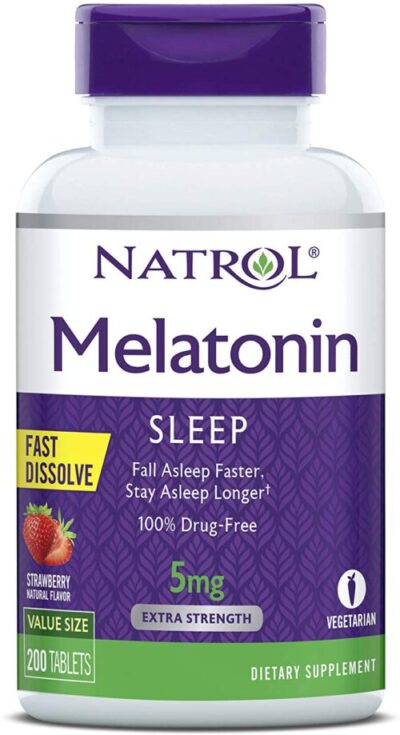Table of Contents
Melatonin is a naturally-occurring hormone. It can be found in your and your pet’s body. Some people take extra melatonin as a medication to relax, de-stress, and facilitate sleep. In some cases, the vet may prescribe a specific dosage of melatonin supplements for a dog.
But what happens if your dog accidentally consumes melatonin? Can you expect dangerous complications? As a dog owner, you must know about the measures to take when your canine potentially consumes a melatonin overdose.
What is Melatonin?
Before you treat your dog for something it had consumed, you need some background information on melatonin. This hormone is produced by a pea-sized gland (called the pineal gland).
The hormone helps us fall asleep. If there’s an excess amount in our system, it makes us feel sleepy. Conversely, if there’s a low amount of melatonin, we will have trouble falling asleep. That’s the case with your dog too.
Light influences how much melatonin is released. The amount drops in the morning with more sunlight exposure. Likewise, the level rises when darkness falls, thus inducing sleepiness.
Normally, when people are prescribed extra melatonin as medicine, the reason is that they cannot fall asleep easily because their pineal gland habitually produces a low level of melatonin. The pills release the hormone and help them to sleep.
When Dogs Eat Melatonin
A healthy dog should never consume melatonin. There’s no need for the hormone to enter its body and induce sleep. But there are instances where a vet might prescribe the hormone to help your dog. The vet will diagnose your pet and recommend melatonin in the following cases:
Anxiety and Stress
Just like humans, dogs can suffer from anxiety and stress. Typically, when you take them on a long road trip or stay separated for a long time, they can get stressed.
Separation anxiety is more common than you might think. As per research, it affects almost 20-40% of dogs. If you leave them alone for too long, they’ll get stressed. To ease their anxiety, vets prescribe melatonin. The hormone also helps them sleep better.
Insomnia
Insomnia in dogs is common among older dogs. Some may develop cognitive dysfunction that hinders their ability to fall asleep.
Among younger dogs, they may have insomnia if they do not have a proper sleep environment. In such cases, the dog might benefit from melatonin.
Cushing’s Disease
Dogs can develop Cushing’s disease, which is a severe disease. In this disease, there’s a formation of a pituitary tumor that causes the abnormal secretion of cortisol in the body.
In dogs, Cushing’s disease symptoms include increased thirst, excess hunger, and frequent urination. The hormone melatonin prevents the body from taking up additional cortisol.
Alopecia
Vets may recommend the use of melatonin for treating alopecia in dogs, also known as flank alopecia. The primary symptom is baldness around the abdomen area. The dog may also experience hair loss across the body. Melatonin will help your dog to fight from the inside.
Melatonin Overdose in Dogs
Melatonin is a safe drug when recommended by a vet and the dog consumes the right dosage. But an overdose can cause moderate to severe complications.
So how do you know that your dog has overdosed on Melatonin? There are a few warning signs. Your dog might have an upset stomach. Signs include discomfort, nausea, diarrhea, gurgling sounds in the belly, and a lack of appetite.
Excessive sleep and weakness and other symptoms of a melatonin overdose. Since there’s an excess amount of melatonin in the body, it will soothe and relax the muscles. So your dog will feel sleepy for a long time. In some severe cases, pet parents might also witness seizures and loss of concentration.
If a melatonin overdose is responsible, the symptoms will appear after 10-20 minutes after consumption. But in rare cases, it can take a few hours. Either way, discuss the matter with your vet as soon as you notice that your dog is feeling ill.
How to Treat a Melatonin Overdose
If your dog suffers from a melatonin overdose, you must first contact your vet. They will gauge the situation and recommend the right treatment. In most cases, the symptoms will fade away on their own, and you do not have to do anything.
Since the drug would have already mixed with the bloodstream, there’s no way to flush it from the body. Therefore, to be on the safe side, you should ensure you’re providing the correct dose to your dog.
A 10-pound dog requires no more than 1 mg of melatonin per day. Dogs weighing 10 to 25 pounds will need 1.5 mg of melatonin to reduce stress. For those weighing between 26 and 100 pounds, 3 mg of melatonin is sufficient.
Dogs weighing more than 100 pounds can consume 3 to 6 mg of melatonin, but not more than that. Unless your vet has prescribed something differently, you should stick to the above figures.
A Quick Summary
Melatonin isn’t fatal to most dogs. Our pets are capable of regulating the hormone on their own. With the proper dosage, you can help your dog to fall asleep faster or feel calmer during stressful situations. Any use of medication and supplements should be under a vet’s supervision.

